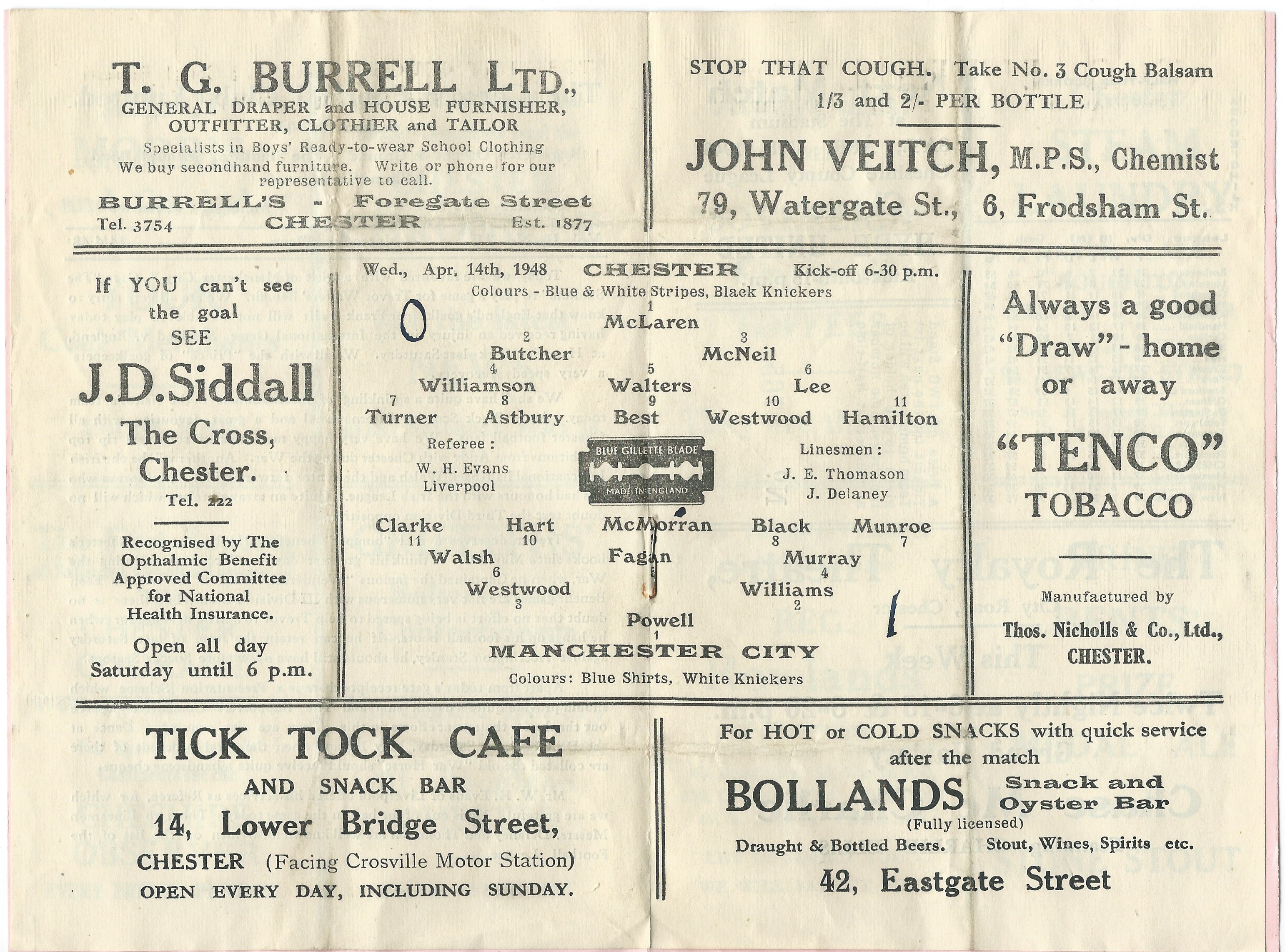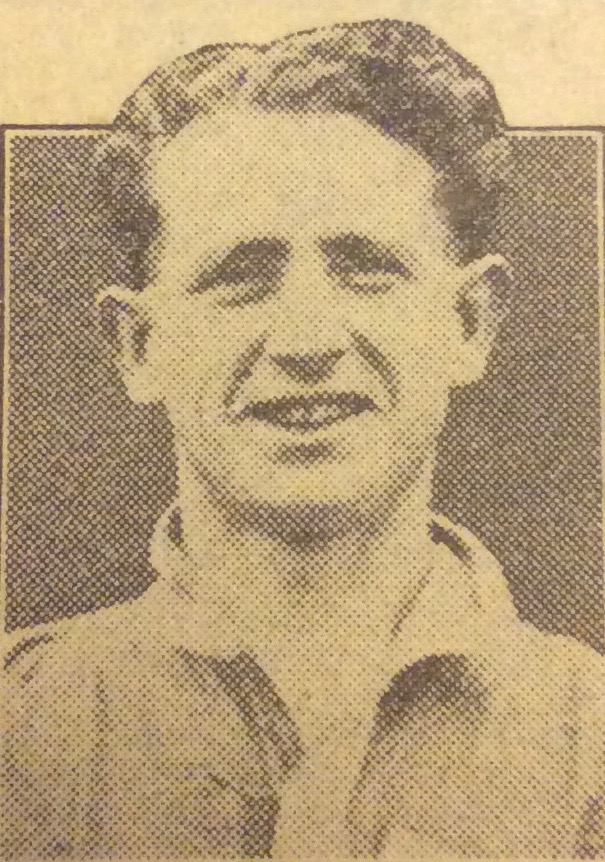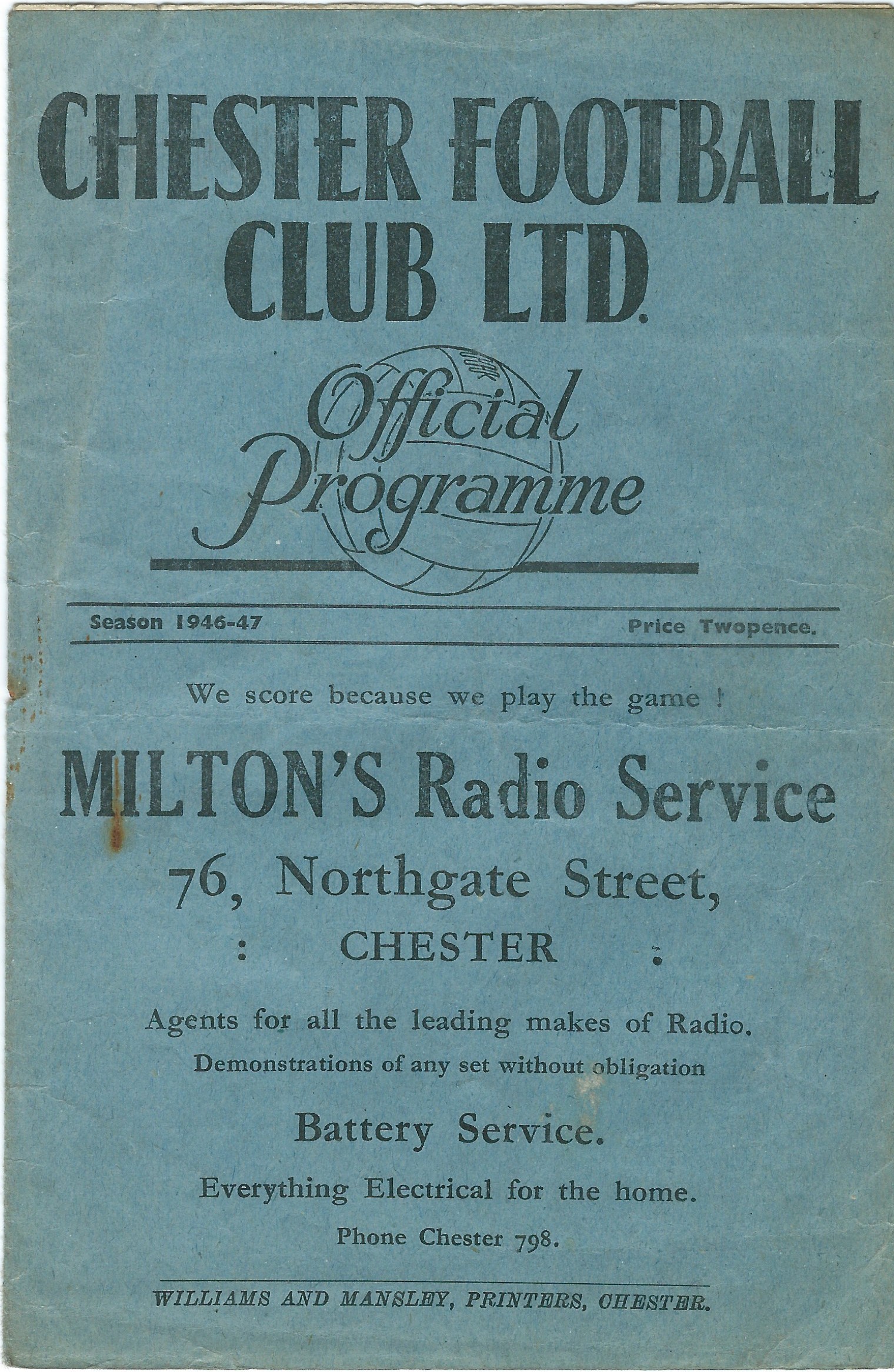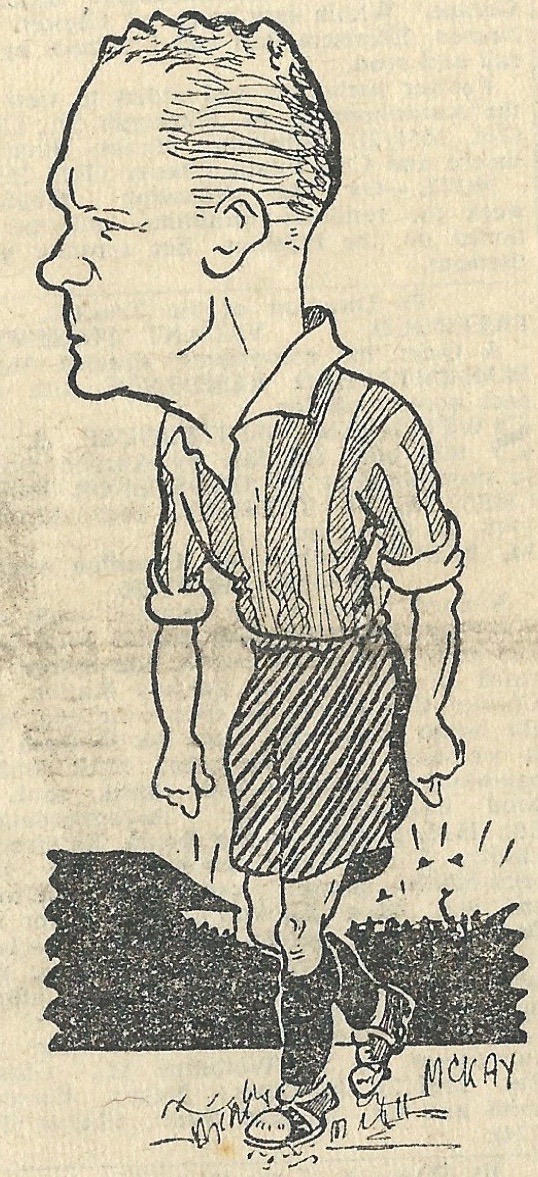1 – Pre-Match
After the 3-1 victory over Bishop Auckland, Chester were paired with fellow Division Three North side and local rivals Tranmere Rovers in the 2nd Round. It was a tough draw against a Rovers team that had shown improved form since the opening weeks of the season. Back in August Frank Brown’s side had secured their only away win of the campaign with a 3-2 victory at Prenton Park thanks to a last minute goal. The bookmakers certainly knew where the smart money should go as Chester were rated at 2,000 to one to win the FA Cup compared with Rovers at a mere 1,000 to one.
From a financial point of view it was considered to be a good draw but, perhaps surprisingly, the game had not been made all-ticket. Prenton Park was estimated to hold between 18,000 and 20,000 and a crowd of 17,359 had already attended their local derby against New Brighton in September. Chester expected a minimum of 3,000 fans to make the short journey to Birkenhead and every available coach in the area had been chartered.
Within the ground Chester had been allocated 140 seats at 3s in the 500 capacity centre stand while the unreserved 1200 capacity wing stand was priced at 2s 6d. The paddock and covered stand behind the goal was priced at 1s 9d and the rest of the ground at 1s 3d.
Only two weeks had passed since the Bishop Auckland game and Tranmere’s confidence was high following a good showing at Halifax when they had recovered from 2-0 down, with just over 20 minutes to go, to draw 2-2. The same could not be said of Chester who had been on the end of a heavy 4-1 defeat at Stockport, regarded as their worst display of the campaign.
The game was scheduled to kick-off at 2pm and in the event of the teams being level after extra time the replay would take place the following Saturday and would be all-ticket.
2 – The Match
The trouncing at Stockport saw Frank Brown make sweeping changes to the team as he pinned his faith on the formation from the previous season. The big change was at centre half where veteran Trevor Walters was restored to the starting eleven with George Williamson taking the place of Frank Marsh at right half and Eric Lee returning to the more familiar role of left half.
There was some surprise at the dropping of Freddie Willcox, and he was replaced at right back by Reg Butcher, who had featured in that position in 1946/47. It was less of a shock to see that Dick Yates had been excluded and his place at centre forward taken by local boy Geoff Coffin. Meanwhile Tommy Astbury had recovered from a knee injury, which had forced him to miss three games, and he returned at the expense of Tommy Best while Harry Colville continued on the left wing.


Although Chester travelled to Prenton Park more in hope than confidence the manager’s gamble paid dividends as his side played with some of their old swagger and secured a place in the 3rd Round thanks to a goal from Tommy Burden thirteen minutes from time. While it was not a brilliant game Chester had the majority of possession and fully deserved the victory which was more comfortable than the scoreline suggested.
In a game dominated by defences the recall of Walters made all the difference and he stood out as a colossus as the Tranmere forwards struggled to make any headway against his rock-like presence. In addition Williamson proved that he was best suited to the half back role while Lee enhanced his reputation with a superb second-half display. Such was the performance of the Chester defence that Jim MacLaren had little to do in goal and it was only in the closing stages that he was forced into a couple of smart saves.
In the first half Chester’s best chance came when Burden sent a beautifully weighted pass through to Bobby Hamilton and his well-judged cross found Coffin but the young striker’s header was over the bar. On the stroke of half time Williamson almost gave Chester the lead but his header, from a Hamilton corner, passed a few inches wide of the upright.
After the break MacLaren saved well from Bridges while Coffin fired into the side netting and Hamilton shot wide after good work from Burden. The winning goal came in the 77th minute when Lee headed forward and the ball fell to Burden whose shot struck the inside of the far upright and rocketed into the net. Tranmere rallied in the closing stages but the Chester defence held firm and almost added a second but Payne made the save of the match from Hamilton.
Although the vast majority of Chester fans were delighted with the result there was still a small group who demonstrated to the directors after the match about the dropping of certain players.
The victory put Chester into the 3rd Round for the fifth consecutive season and a chance of drawing one of the big clubs from the top two divisions.
Tranmere Rovers – Payne, Johnstone, Connor, Steele, Bell, Malcolm, Harlock, Lamb, Bridges, Leeming, Pollard
Chester – MacLaren, Butcher, McNeil, Williamson, Walters, Lee, Hamilton, Burden, Coffin, Astbury, Colville
Scorer – Burden 77
Attendance – 14,132
3- Post-match
The FA Cup victory vindicated Frank Brown’s team selection and he kept the same lineup for the following game at Oldham Athletic. Unfortunately his side couldn’t repeat the performance and were well beaten 3-1. The match at Boundary Park proved to be the last in Chester colours for Harry Colville after only four Football League appearances and two FA Cup ties. Despite a goal on his debut, ironically at Tranmere, Harry failed to create an impression at Sealand Road although the Chester Chronicle, reporting on the FA Cup tie at Prenton Park suggested that he should be given an extended trial in the first team to “overcome an obviously nervous disposition”. The former Falkirk and Raith Rovers player returned to the reserves where he played a handful of games before being given a free transfer at the end of the campaign.
Harry rejoined his former club Raith Rovers and within 12 months had won a Scottish League Cup runners-up medal and promotion from the Scottish Second Division. Despite appearing as an outside left at Chester Harry’s turn of speed and imposing presence saw him successfully converted to centre half and over the next seven seasons he made 290 first team appearances for the Kirkcaldy club. After returning to Falkirk for a season Harry signed for Dunfermline Athletic where he made 178 consecutive appearances in the centre of defence before retiring at the age of 36. In 1960 he was appointed manager of Cowdenbeath where he remained for four seasons. Away from football Harry proved himself an all-round sportsman by winning the British Curling Championship on three occasions. He died in March 1999.

Another Scotsman, Jim MacLaren, also made his final FA Cup appearance in the Tranmere game. After three league defeats in December he lost his place to George Scales but returned to first team duties in April and retained his position at the beginning of the 1948/49 season. Unfortunately, Jim did not have the best of starts to the campaign and when his error cost two points in a 2-1 home defeat to Darlington he was dropped by Frank Brown and replaced by Scales. In October Chester signed the experienced Ted Elliott from Wolves and it was clear that Jim’s days at Sealand Road were numbered. In November he asked to be put on the transfer list which resulted in a move to Carlisle United at the end of the year. Like Colville the transfer proved to be his making and the Crieff-born keeper went on to make 261 appearances for the Cumbrians including a record breaking run of over 200 consecutive league and cup games from 1950 to 1954. In 1955 Jim was given a free transfer and crossed the border to join Berwick Rangers where he played for a further 18 months. After leaving football he worked as a sales rep in both Scotland and Lincolnshire and died in August 2004.
Man of the Match Trevor Walters was the third player appearing for the final time in a Chester FA Cup tie. The veteran defender had been a stalwart at Sealand Road, having joined the club in 1937, and although he made a further 17 league appearances in 1947/48 he made just a single appearance the following year and joined Caernarvon Town as player-coach in March 1949. He later played for Flint Town.
In April 1948 Trevor was awarded a benefit game against Manchester City, attended by more than 8,000 supporters, the first player to rewarded in this way for more than 40 years. He made a total of 151 league appearances for Chester but this would have been considerably higher had it not been for the war when he served as a Sergeant-Instructor in the army. While based at Aldershot he captained the local team which included guest players like Matt Busby, Joe Mercer and Tommy Lawton. He also served in the Middle East and captained the Wanderers team that featured Tom Finney and Bob Paisley.
For many years he was landlord of the Swan Hotel in Flint and later worked for Hawker Siddeley. He continued to attend Chester home games and died in June 1989.
Opponents Tranmere Rovers faded in the second half of the campaign and, despite a run of five consecutive victories in January and February eventually finished in 18th place in the Third Division North.
Meanwhile Chester’s reward was an away trip to London in the 3rd Round and a first ever trip to Crystal Palace.
Copyright © http://www.chesterfootballhistory.com All Rights Reserved






















